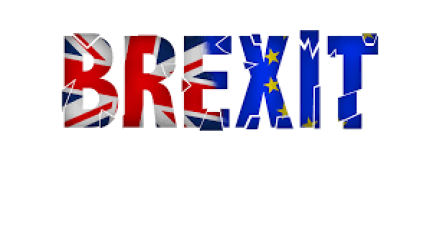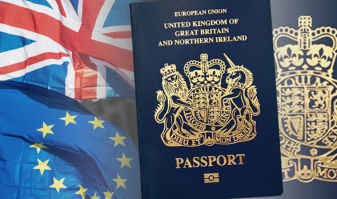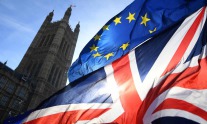Brexit news
Check back here regularly to find out what's going on at D&G Union.
British passport holders if the UK leaves the EU without a deal
Advice for British passport holders if the UK leaves the EU without a deal.
https://www.gov.uk/guidance/passport-rules-for-travel-to-europe-after-brexit
Check a passport for travel to Europe
Before booking travel, check your adult and child passports meet the new rules that apply if the UK leaves the EU without a deal after 29 March 2019.
Rules for passports
The rules for travel to most countries in Europe change if the UK leaves the European Union (EU) with no deal. After 29 March 2019:
- You should have at least 6 months left on your passport from your date of arrival. This applies to adult and child passports.
- If you renewed a passport before it expired, extra months may have been added to your new passport’s expiry date. Any extra months on your passport over 10 years may not count towards the 6 months that should be remaining for travel to most countries in Europe.
The new rules will apply to passports issued by the UK, Gibraltar, Guernsey, the Isle of Man and Jersey.
List of countries affected
The new rules will apply for travel to and between countries in the Schengen area. These are:
Austria, Belgium, Czech Republic, Denmark, Estonia, Finland, France,Germany, Greece, Hungary, Iceland, Italy, Latvia, Liechtenstein, Lithuania, Luxembourg, Malta, Netherlands, Norway, Poland, Portugal, Slovakia, Slovenia, Spain, Sweden and Switzerland.
Travel to other EU countries
The new rules do not apply when travelling to Ireland.
Bulgaria, Croatia, Cyprus and Romania are not in the Schengen area. You should check for these countries at: https://www.gov.uk/foreign-travel-advice
European Council President Donald Tusk has spoken of a "special place in hell" for "those who promoted Brexit without even a sketch of a plan of how to carry it out safely".
He was speaking after talks with Irish leader Leo Varadkar in Brussels.
Brexit-backing MPs reacted with anger to the comments, accusing Mr Tusk of "arrogance".
Downing Street said it was a question for Mr Tusk "whether he considers the use of that kind of language helpful". to red more go to link:
https://www.bbc.co.uk/news/uk-politics-47143135
Does the EU want to do a deal after saying this?
With the UK on course to leave the European Union in March next year, the country faces four possible scenarios.
Brexit is the impending withdrawal of the United Kingdom from the European Union. In a referendum on 23 June 2016, a majority of British voters supported leaving the EU.
Leave with a deal
The UK and the EU both insist they want as amicable a divorce as possible, with a legal agreement setting out the kind of relationship they will have when the UK is no longer a member of the club.
Prime Minister Theresa May wants to keep close ties with the EU in certain areas, such as trade in agricultural products and allowing skilled migrants access to jobs in the UK.
She says her plan will allow Britain to take back control of its laws, money and borders, just like people voted for in the 2016 EU referendum, while also allowing as "frictionless" trade as possible and avoiding a physical border for Northern Ireland.
But it has been attacked as an unworkable compromise by people from both the Remain and Leave ends of the debate.
The EU may also decide to reject it, but the two sides are still hoping to strike some kind of deal by the autumn and, despite criticism and ministerial resignations, Mrs May believes this is the best option.
Leave without a deal
A clean break with the EU. The UK would fall back on its membership of the World Trade Organization (WTO), the global body governing international trade.
UK exports to the EU would be subject to the same customs checks and taxes the EU currently imposes on countries like the United States.
Those arguing for this option - the so-called "hard Brexiteers" - say it would create a truly independent nation able to strike its own beneficial trade deals around the world.
But opponents say it would be catastrophic for British business and have warned about chaos at the borders, higher food prices and shortages in the shops.
Stay in the EU
The UK has formally triggered the mechanism to leave the EU at 23:00 GMT on 29 March 2019.
To reverse that at this late stage would mean a huge loss of political face, and probably require a new prime minister, with the backing of voters in a general election.
Hold another referendum
The UK government has ruled this out but there have been a number of people calling for a fresh vote but how many would you want? Until you get what you like or what the country first voted for and to leave.
With Parliament apparently split over what kind of Brexit it wants, a referendum on the final deal agreed by Theresa May in Brussels might yet end up being the only way to break the deadlock.
Those campaigning for another referendum say voters should get the final say. Labour's leadership say a general election should be held rather than another referendum.
Parliament needs to start working together to get the best for UK, if it’s a deal or no deal we look weak as country still divided, we need to get on one path, believe and trust we will be better.
What does the government White Paper reveal?
The government has published its long-awaited Brexit white paper. The document is 104 pages long and follows last week's Chequers agreement which set out the sort of relationship the UK wants with the EU after Brexit.
Mr Johnson has written in the Daily Telegraph that the approach agreed at Chequers "means disaster" for Britain.
The ex-foreign secretary said the PM's plan would hand the EU "victory".
But Mrs May's official spokesman said: "There's no new ideas in this article to respond to."
Downing Street said the prime minister's blueprint for future relations with the EU, hammered out with cabinet members at her country residence in July, was deliverable and could win the support of the House of Commons.
And former home secretary Amber Rudd told the BBC's Politics Live: "Once again, it's a case of leap before you look - there's absolutely no proposal here."
Ms Rudd said the Chequers plan represented "the best shot we have of Brexit that's going to work for the UK".
Brexit deal what's changed?
The Government made a statement on Brexit, ahead of three days of debate and votes on the UK's withdrawal from the European Union, which are expected on Tuesday, Wednesday and Thursday.
On 26 February 2019 the Prime Minister made a statement where she committed to "hold a second meaningful vote by Tuesday 12 March at the latest." As well as holding additional votes on the subsequent two days, if the Prime Minister's withdrawal agreement is defeated in the House, on leaving the European Union without a deal and extending the Article 50 period.
In anticipation of these votes, the Government is making a statement on Brexit.
So has anything changed? Yes, and no.
The statement issued by the UK and the EU (known officially as a joint interpretive instrument) gives added legal reassurance that both sides intend that the backstop plan for the Irish border, if it ever needs to be used, would be only a temporary measure.
But the EU has said this before - notably in a letter sent to Theresa May in January by the President of the European Commission Jean Claude Juncker and the President of the European Council Donald Tusk.
On 14 January, Mrs May said the attorney general had confirmed that the letter meant that EU conclusions about the temporary nature of the backstop "would have legal force in international law".
So this new document is just another layer of reassurance.
In fact, the joint instrument will have the same legal standing as the withdrawal agreement . But it does not replace, over-rule or contradict it.
It is worth emphasising that the text of the backstop itself has not changed, and that means it has no guaranteed end date and there is no unilateral exit mechanism that has been agreed by both sides.
So some of the demands made by Brexiteers, which the prime minister said she would seek to address, have not been met.
The motion that the government has laid before Parliament in advance of the meaningful vote reflects all this. It says the joint instrument reduces the risk that the UK could be held in the backstop in Ireland indefinitely - it doesn't say that it removes that risk altogether.
Alongside the joint instrument, two other documents have been agreed: a joint statement that commits both sides to try to develop technological solutions for the Irish border by the end of 2020; and a unilateral UK statement which sets out the government's interpretation of how it could eventually exit the backstop if the EU acts in bad faith.
This unilateral statement is only the view of one side. But the fact that the EU has chosen not to object to it means that it does carry some weight.
Again, that is not the same as a legal guarantee, but the EU will argue that it has gone as far as it can to meet the political concerns being expressed in Westminster.
Irish backstop
Taken together, the documents issued last night do offer further reassurance for those who fear that the EU wants to trap the UK permanently in the backstop - something the EU has always insisted it has no intention of doing.
But the real problem is finding something that can replace the backstop, which also fulfils the demand to keep the Irish border as open as it is now.
No-one knows exactly what that might be: a basic free trade agreement would not be enough.
And an agreement to search for alternative arrangements is no guarantee that they will actually be found in a relatively short period of time before the end of 2020.
Theresa May and Donald Trump
Theresa May and Donald Trump are holding talks at her country retreat Chequers, following his controversial comments on the PM's Brexit plan.
Mr Trump said the PM's plan would "probably kill" any trade deal with the US.
But on Friday, he said he and Mrs May had "probably never developed a better relationship" than during this trip - his first to the UK as president.
Meanwhile, a giant blimp of Mr Trump as a baby is floating in central London.
It is part of a demonstration in Parliament Square, one of many due to take place across the UK on Friday.
In his interview with the Sun, Mr Trump also said that former Foreign Secretary Boris Johnson - who disagrees with the PM on Brexit and resigned this week - would make a "great prime minister", adding "I think he's got what it takes".
He also renewed his criticism of London Mayor Sadiq Khan over last year's terror attacks in London, saying he had done "a terrible job".
Downing Street has not yet reacted to Mr Trump's remarks, but Chancellor Philip Hammond said the talks will be "very positive".
Theresa May has been making her case for a US free trade deal, and says Brexit is an "unprecedented opportunity" to create jobs in the UK and US.
The US president and his wife, Melania, were given a red-carpet reception at Blenheim Palace, Oxfordshire on Thursday evening.
They were at a black-tie dinner with Mrs May as news broke of his interview with the newspaper, which said it was conducted while he was in Brussels.
After it was published, White House spokeswoman Sarah Sanders said the president "likes and respects Prime Minister May very much", adding that he had "never said anything bad about her".
Mr Trump - who has been a long-time supporter of Brexit - told The Sun that the UK's blueprint for its post-Brexit relations with the EU was "a much different deal than the people voted on".
He said the Brexit proposals Mrs May and her cabinet thrashed out at the PM's country house Chequers last week "would probably end a major trade relationship with the United States."
"We have enough difficulty with the European Union," he said, saying the EU has "not treated the United States fairly on trading".
He also said Mrs May had not listened to his advice on how to do a Brexit deal, saying: "I would have done it much differently.
"I actually told Theresa May how to do it but she didn't agree, she didn't listen to me. She wanted to go a different route," he said.
Tom Newton Dunn, the Sun journalist who interviewed Mr Trump, said the US president seemed "sensitive" and knew about the "Trump baby" inflatable.
"He's really quite stung by the criticism he's been getting," said Mr Newton Dunn. "He knew all about the baby blimp. I think it hurt him."
The BBC's political editor, Laura Kongsberg, said Mr Trump's interview had "driven a bulldozer" through Mrs May's claim that the UK would be able to get decent trade deals with the wider world, while sticking to the EU rules.
But Foreign Office minister Sir Alan Duncan said things had "moved on" since Mr Trump's interview - which was carried out before he arrived in the UK - and the mood at Thursday night's dinner was "fantastically positive and did focus a lot on trade".
The government does not see Mr Trump's behaviour as "rude", said Sir Alan, adding: "Donald Trump is a controversialist. That's his style."
Mayor of London Sadiq Khan defended his decision to allow the giant Trump baby inflatable to fly over London, saying: "The idea that we limit the right to protest because it might cause offence to a foreign leader is a slippery slope".
And, responding to Mr Trump's criticism of his response to terrorism, Mr Khan said it was "interesting" that he "is not criticising the mayors of other cities" which have also experienced terror attacks.
Meanwhile, Shadow Foreign Secretary Emily Thornberry said the PM "should be standing up to [Mr Trump]" after he "slagged her off", instead of holding his hand. as
Mr Trump's comments came on the same day the UK government published its proposal for its long-term relationship with the EU.
The plan is aimed at ensuring trade co-operation, with no hard border for Northern Ireland, and global trade deals for the UK. Mrs May said the plan "absolutely delivers on the Brexit we voted for".
But after ministers reached an agreement on the plan at Chequers a week ago, leading Brexiteers Boris Johnson and David Davis resigned from the cabinet.
Mrs May and Mr Trump are watching a joint counter-terrorism exercise by British and US special forces at a military base.
The pair will then travel to Chequers - the PM's country residence in Buckinghamshire - for talks also being attended by Foreign Secretary Jeremy Hunt.
Extra security is in place to police protests planned for the second day of Mr Trump's visit.
The president and first lady will travel to Windsor on Friday afternoon to meet the Queen, before flying to Scotland to spend the weekend at Mr Trump's Turnberry golf resort. This part of the visit is being considered private.
Theresa May appears to have won the backing of Cabinet Brexiteers to double the UK's "divorce bill" offer from £20bn to £40bn.
At a tense two-hour meeting of senior ministers in 10 Downing Street, Boris Johnson and Michael Gove are believed to have agreed to the move - with conditions.
As a result, the Prime Minister is now poised to offer £40bn later this week if the rest of the EU is ready to move towards trade talks in December.
And in another significant move aimed at breaking the deadlock in Brexit negotiations, the UK will allow a role for the European Court of Justice after Brexit.
The moves were agreed at a meeting of the Cabinet's Exit and Trade (Strategy and Negotiations) Cabinet committee, already being called a Brexit "war Cabinet".
An early signal that ministers were ready to agree to double the UK's divorce bill offer came from the Brexit Secretary David Davis as he arrived for the meeting.
.....................................................................................................................................
Will Brits will ‘go bananas?’ at £40bn Brexit divorce bill which is ‘playing Santa’ for the EU, top Tories warn as Theresa May meets ministers to thrash out size of payment.
To read more: https://news.sky.com/story/brexit-key-leave-ministers-appear-to-back-16340bn-eu-divorce-bill-11136452
Theresa May has signed the letter that will formally begin the UK's departure from the European Union.
Giving official notice under Article 50 of the Lisbon Treaty, it will be delivered to European Council president Donald Tusk on Wednesday.
In a statement in the Commons, the prime minister will then tell MPs this marks "the moment for the country to come together".
It follows June's referendum which resulted in a vote to leave the EU.
Article 50
2. A Member State which decides to withdraw shall notify the European Council of its intention. In the light of the guidelines provided by the European Council, the Union shall negotiate and conclude an agreement with that State, setting out the arrangements for its withdrawal, taking account of the framework for its future relationship with the Union. That agreement shall be negotiated in accordance with Article 218(3) of the Treaty on the Functioning of the European Union. It shall be concluded on behalf of the Union by the Council, acting by a qualified majority, after obtaining the consent of the European Parliament.
3. The Treaties shall cease to apply to the State in question from the date of entry into force of the withdrawal agreement or, failing that, two years after the notification referred to in paragraph 2, unless the European Council, in agreement with the Member State concerned, unanimously decides to extend this period.
4. For the purposes of paragraphs 2 and 3, the member of the European Council or of the Council representing the withdrawing Member State shall not participate in the discussions of the European Council or Council or in decisions concerning it.
A qualified majority shall be defined in accordance with Article 238(3)(b) of the Treaty on the Functioning of the European Union.
5. If a State which has withdrawn from the Union asks to rejoin, its request shall be subject to the procedure referred to in Article 49.
...........................................................................................................................
Mrs May's letter will be delivered to Mr Tusk at 12:30 BST on Wednesday by the British ambassador to the EU, Sir Tim Barrow.
The prime minister, who will chair a cabinet meeting in the morning, will then make a statement to MPs confirming the countdown to the UK's departure from the EU is under way.
She will promise to "represent every person in the whole United Kingdom" during the negotiations - including EU nationals, whose status after Brexit has yet to be settled.
"It is my fierce determination to get the right deal for every single person in this country," she will say.
"For, as we face the opportunities ahead of us on this momentous journey, our shared values, interests and ambitions can - and must - bring us together."
http://www.bbc.co.uk/news
Key events and possible timings
- 29 March, 2017 - UK triggers Article 50
- 29 April - EU summit of the 27 leaders (without the UK) to agree to give the European Commission a mandate to negotiate with the UK
- May - European Commission to publish negotiating guidelines based on the mandate the EU leaders give it. The EU might say something about possible parallel negotiation on a future EU-UK trade deal
- May/June 2017 - Negotiations begin
- 23 April and 7 May - French presidential elections
- 24 September - German parliamentary elections
- Autumn 2017 - The UK government is expected to introduce legislation to leave the EU and put all existing EU laws into British law - the Great Repeal Bill
- October 2018 - Aim to complete negotiations
- Between October 2018 and March 2019 - The Houses of Parliament, European Council and European Parliament vote on any deal
- March 2019 - UK formally withdraws from the European Union (The Article 50 negotiations could be extended, but this is subject to the approval of the other 27 EU member states)
News title
Description of news story




